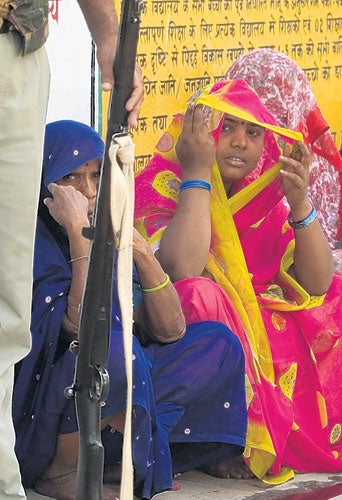Violent start to Indian election as rebels kill 17
Maoists shoot and kidnap voters, officials and soldiers on first polling day

Your support helps us to tell the story
From reproductive rights to climate change to Big Tech, The Independent is on the ground when the story is developing. Whether it's investigating the financials of Elon Musk's pro-Trump PAC or producing our latest documentary, 'The A Word', which shines a light on the American women fighting for reproductive rights, we know how important it is to parse out the facts from the messaging.
At such a critical moment in US history, we need reporters on the ground. Your donation allows us to keep sending journalists to speak to both sides of the story.
The Independent is trusted by Americans across the entire political spectrum. And unlike many other quality news outlets, we choose not to lock Americans out of our reporting and analysis with paywalls. We believe quality journalism should be available to everyone, paid for by those who can afford it.
Your support makes all the difference.The start of voting in India's general election – by far the biggest in the world – was scarred by violence as Maoist rebels were blamed for the deaths of at least 17 people, including five election officials and almost a dozen police officers.
The election officials were killed by a landmine blast in the state of Chhattisgarh. In the eastern state of Jharkhand, eight officials were kidnapped. In areas controlled by the Maoists and nearby districts under their influence, many voters opted not to go to the polls.
Despite the fear of violence, a healthy percentage of voters in the first of five phases of voting appeared to make it to cast their vote. Polling experts predicted a turnout of up to 62 per cent.
"People want democracy to triumph," said Tarun Gogoi, the senior official in Assam, which has been persistently hit by insurgency.
India's total electorate stands at about 714 million. Such is the scale that voting is staggered over a month with different states going to the polls on different days. The results are not expected until 16 May.
As the government yesterday deployed hundreds of thousands of police to protect more than 140 million people eligible to vote in the first phase, some election officials in the most remote areas rode elephants to polling stations near the border with Burma. In the Andaman Islands in the Bay of Bengal, ballots were brought to voters by a two-day sea trip.
Polls suggest that the ruling Congress party-led coalition will most likely emerge as the group with most seats, seeing off a challenge from an alliance headed by the Hindu-nationalist Bharatiya Janata Party (BJP).
But for either to govern, both would need to win the support of the smaller parties with specific local interests that are dotted around the country. As a result, what happens after 16 May, when the results are finally known, will be as important as what happens before.
But the co-ordinated attacks by the Maoist rebels, known as Naxalites, were the most immediate concern yesterday. They are thought to be the first concerted such effort by the Naxalites on election day.
Early yesterday morning, suspected rebels opened fire on paramilitary forces patrolling in the eastern state of Jharkhand, killing five soldiers. Reinforcements were sent to secure the area in Latehar, about 80 miles north-west of the state capital, Ranchi.
Meanwhile, in the neighbouring state of Bihar, suspected rebels attacked a polling station in Gaya district, killing a policeman, said the area's deputy inspector general, Anupama Nilokar.
The Naxal rebels have fought the government for decades in a handful of rural regions, charging authorities with plundering natural resources while providing little to local residents.
Since Saturday, nearly 20 police officers have died in their attacks. Reinforcements have been rushed to the targeted areas from New Delhi.
It was also announced that the aspiring politician Varun Gandhi, who was jailed for an anti-Islamic diatribe that he delivered during an election rally, which was alleged to be hate speech, is to be released on parole.
Mr Gandhi, 29, is the grandson of India's former prime minister, Indira. He promised not to make provocative speeches for the rest of the campaign.
The Indian Supreme Court ordered that he should be made to serve two weeks of parole. The move allows him to enter the election as a candidate for the BJP. "The Bharatiya Janata Party welcomes the Supreme Court decision," said the party spokesman Balbir Punj. Mr Gandhi is expected to file his candidacy papers next week in Pilibhit in Uttar Pradesh state, the seat formerly held by his mother.
Join our commenting forum
Join thought-provoking conversations, follow other Independent readers and see their replies
Comments